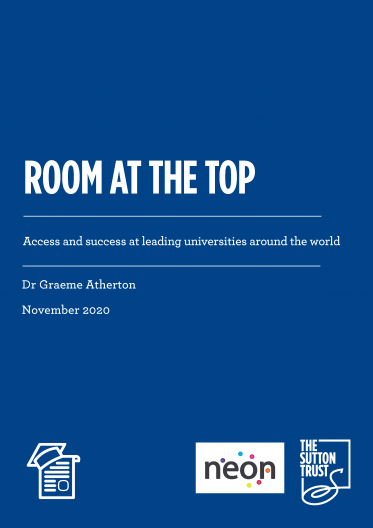1. Show strategic leadership on access/success
Research examining the progress in advancing socio-economic diversity suggests that leading universities in the US that have been most successful have made a strategic commitment to this goal with strong backing from institutional leaders, for example in mission statements.
2. Set ambitious aims in financial support and communicate them to students
Work done by the World Bank looking at the relative effectiveness of financial support in producing greater access to higher education for those from low-income backgrounds shows that financial support needs to be ambitious and significant in scale. The study includes examples of how, in the US, leading institutions are adopting a goal of ‘100% financial support’ for low-income students.
3. Undertake open institutional conversations
The analysis undertaken for this study identifies powerful examples of how this commitment can manifest itself via institutional conversations on access and success from the US, South Africa and Canada. It could be a significant step forward if leading universities in England were to, as Harvard and others have done, initiate an open institutional conversation on diversity and inclusion that included a key part of it access/success. However, it is vital that these conversations produce tangible action.
4. Explore the pros and cons of admission quotas
In several states in the US, most notably Texas, quota admission systems have been used, where a given % of students from each school are guaranteed entry into leading universities in the state. The evidence from Texas and other US states appears on balance positive. While this would be a significant departure in the UK, it may be worthwhile exploring how similar approaches could be piloted here. In particular, focusing on some areas of the country where schools send very few students from widening access target groups to leading universities.
5. Make ‘First Generation’ a celebrated identity and form dedicated student support units
The difference between how first generation and low-income student identity is dealt with in the US and other countries, including the UK, is striking. If leading universities were to explore such approaches as their counterparts at the top of global rankings tables are doing it would display their willingness to lead on access/success issues nationally as they do on research.
6. Develop student support models based on theory and evidence
Recent reports in England of unwelcoming environments at prestigious universities for those from less well-off backgrounds highlight that widening access is only one part of the story, it must be followed by action that supports the success of such students when they arrive. The best examples of coherent long-term approaches to supporting students when they enter higher education come from South Africa, the United States and Ireland, and are grounded strongly in theoretical approaches which look to tackle ‘deficit models’ of understanding students from low-income and other marginalised groups.
7. Collaborate together in a pro-active way
The study indicates the value of leading universities working together both through representative organisations and charities to take forward access and success goals, with particularly strong examples from Australia, United States and Ireland. Such collaborative work does happen in the UK, but this study highlights its value and how it could be extended.
8. Engage in national access/success strategies
The evidence from other countries that have national access and success strategies (in particular Australia, Ireland and the United States) show that leading universities benefit from them. One overall difference between these programmes and those in England in particular, are that they focus on both access and success. Including a focus on success in national programmes may be particularly valuable to explore.
9. Form a global network to exchange practice/knowledge in the field of access and success
There is a range of similar but varied work being undertaken in outreach across leading universities globally, which includes leading universities from North America, Europe, Africa and South America. There would be great potential value in such universities learning more from each other regarding what different approaches are possible and the benefits they can bring.
10. More International research looking at impact on access and success in leading universities is needed
While this study does attempt to capture the present situation where access/success to leading universities is concerned, more is needed to identify what work is being done, and, especially, to show its impact. The study identifies a number of programmes focused on both access and success that were in their relatively early stages where future impact evaluation may be very beneficial.
